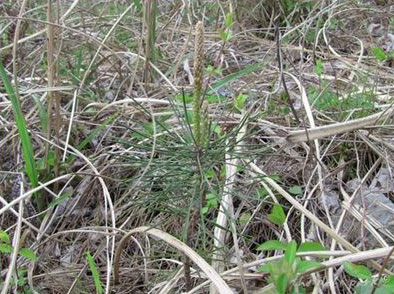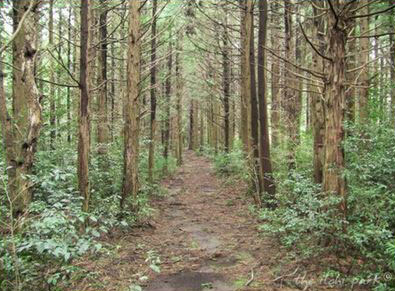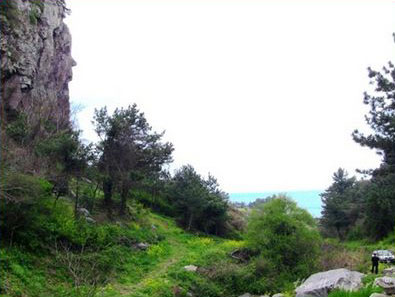Lately I’ve been thinking a lot about the concept of Jangsaeng. Jangsaeng is a Korean word that originated from ancient Korean Sundo culture. It roughly translates as “longevity”. However, the word in English does not quite carry the same connotation. For many people, longevity primarily means long life in respect to passage of time. But the Korean word suggests not only living many years, but also living them in a truly vital way. Jangsaeng people carry a youthful vitality into their older years. Much more than just long lives, Jangsaeng people have fulfilling lives. They have a spring in their step and a twinkle in their eye that is an inspiration even to the youngest ones around them.
The Jeolmul Recreation Forest on Jeju Island in South Korea has a road called the Jangsaeng Woodland Road. This famous walking trail is easy enough even for the older adult. It is said that if you walk this road frequently you will have a Jangsaeng life.
I decided to visit the Jangsaeng Woodland Road to see what I could learn about Jangsaeng from it. I meditated as I walked and kept a heightened awareness. I’d like to share some of the insights I had as I traveled down it.
This harubang signpost is pointing the way to the Jangsaeng Woodland Road. Harubangs are traditional cultural icons of Jeju Island. I learned on my way that the cedar trees that grow here are very healthy because they are said to emit phytoncides, bactericidal substances that are very good for the treatment of atopy, a kind of allergy. In this forest, even the trees help you with Jangsaeng!
.jpg)
I found this unique and wonderful tree with three knot holes along the path.
.jpg)
When I saw this unusual tree I thought, “Despite any early difficulties, it did not lose hope. Through ceaseless effort, it managed to grow tall. It shows us that, with effort, anyone can be successful.”

This baby pine tree grows beautifully. It’s just beginning its path to Jangsaeng. I hope it becomes a tree that serves the good of all people (Hong Ik).

Here is the secret forest of Jeju Island, where many Japanese cypresses grow. These trees emit ten times the quantity of phytoncides as that produced by the cedar trees around the Jangsaeng Woodland Road.

This is Samhap Bigyeong Ravine, which is said to be the last place Xu Fu went in search of the Elixir of Life. Xu Fu was sent by Qin Shi Huang, the first Emperor of China, and was accompanied by a retinue of 5000 people. The rock visible at left is called “Grandfather Xu Fu.”
As I strolled down the Jangsaeng Woodland Road, I realized that in today’s world, many people have done much to promote longevity. People today are living longer and longer as medicine advances. But extended life span should not be the only goal. It is more important that we live more fulfilling, happy lives, not just long lives.
Personal and social success is clearly visible, but success in Jangsaeng is not. It is an internal success instead of an external one. Although you have to compete for personal or social success, you don’t need to compete for Jangsang. Not everyone can be successful in society, but all can walk the path of Jangsaeng.
Your mind is most important for living a Jangsaeng life. The mind of a Jangsaeng person is not negative. Instead, they have a strong conscience that shines through in everything they do. We can recognize and walk the path of Jangsaeng only if we listen to our conscience. Then we will have a good mind. Only when we restore a good mind do our later years become beautiful.

9 Comments. Leave new
Hi! I found your blog on Google.It’s really well written and it helped me a lot.
Continue the good work!
Hi! I found your blog on Bing.It’s really comprehensive and it helped me a lot.
Continue the good work!
Thanks for creating this. I really feel as though I know so much more about the topic than I did before. You should continue this, Im sure most people would agree youve got a gift.
Thanks for posting, I like this blog!
Thank you for creating this blog and sharing your viewpoint. I enjoy reading it within my lunch break at the office. It is nice to take my mind off work even though for only 30 mins. Cheers
This weblog seems to recieve a large ammount of visitors. How do you promote it? It offers a nice unique spin on things. I guess having something useful or substantial to give info on is the most important thing.
this is nice information need to know more
Thanks for sharing the information with us.
This is precisely what i was looking for. thank you for the helpful article and keep up the excellent work! My best regards, Clare.